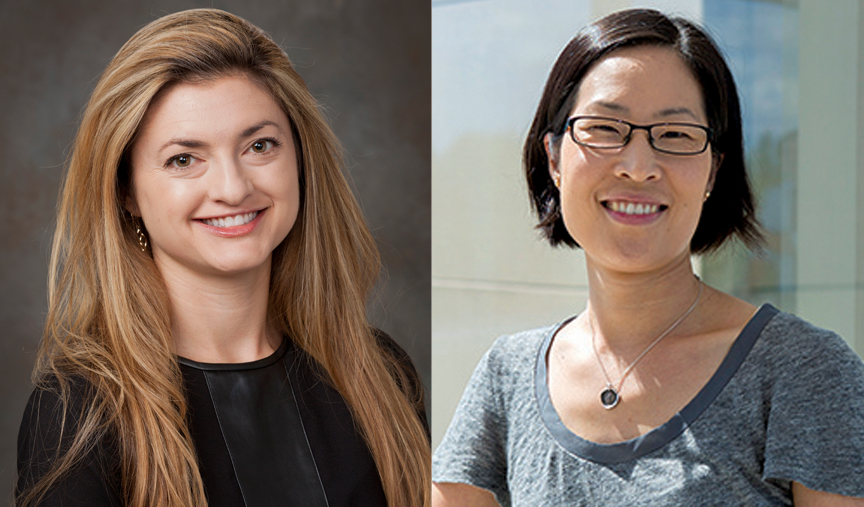
Courtesy Yale Office of Public Affairs & Communications
Three junior faculty members were honored at a dinner last week for academic prizes they received in the spring.
A celebratory Nov. 2 dinner at Zinc recognized economics professor Amanda Kowalski, professor of mechanical engineering and materials science Judy Cha and history professor Paul Sabin for their prize-winning work. Kowalski and Cha were each awarded the Arthur Greer Memorial Prize for Outstanding Scholarly Publication or Research in the natural or social sciences, and Sabin won the Samuel and Ronnie Heyman Prize for Outstanding Scholarly Publication or Research by a junior faculty member. At the dinner, divisional deans for each of the honorees’ respective departments spoke about their award-winning work and emphasized the importance of contributions by junior faculty.
“The dinner is just a fantastic opportunity to celebrate some really wonderful scholarship from across the different intellectual traditions that are represented at the University,” Dean of Social Sciences Alan Gerber said. “Everyone just loved to hear about the work that was being done in the humanities, the work being done by our scientists, the work being done by our social scientists — you get to learn about really exemplary research being done and it makes you feel very positive and reminds you of all the great things your colleagues are doing.”
Kowalski said she was told the committee awarded her the Greer Prize for her work in health policy, specifically her recently published paper in the American Economic Review called “Adverse Selection and an Individual Mandate: When Theory Meets Practice,” which uncovered a welfare gain of 4.1 percent per person or $51.1 million annually in Massachusetts due to a reduction in adverse selection.
Kowalski added that she is grateful for the people who have supported her research.
“In my courses, I often assign problem sets based on my papers, including the paper specifically cited by the Greer award,” Kowalski said. “These problem sets are intended to give students a deeper understanding of the research process based on my firsthand experience.”
Sabin received the Heyman Prize for his 2013 book “The Bet: Paul Ehrlich, Julian Simon, and Our Gamble of Earth’s Future,” a discourse on the environment and scarce resources.
Cha speculated that she was presented with the Greer Prize for her general research and body of work, rather than for any particular publication. Cha has worked for nearly four years, researching electrical properties of semiconductive materials and designing new ones for energy and electronic applications.
“I think [the Greer Prize] is also a boost to my group morale,” Cha said. “Because as a professor, I don’t do experiments myself in the lab anymore — it’s the graduate, undergraduate and postdoctoral students that do the experiments that find new things and then tell me about it. It’s a recognition for them as well, because this is about their hard work, and I’m just putting a face on [their] behalf.”
Both prizes award funding to recipients to help them further their research, Cha said. Gerber said he does not know if there are any specific restrictions or guidelines about how the monetary gift could be used.
The Wednesday dinner was meaningful because it allowed faculty from the social sciences, sciences and humanities to “mingle” and learn about each other’s research, bringing together professors from different divisions that might not otherwise engage with each other, Cha said.
“More than the monetary gift, the recognition from Yale really validates what I’m doing,” Cha said. “It’s a form of encouragement and I take that to be more of a greater value than the research funds itself.”
Kowalski said she was grateful for the senior faculty “who took time out of their schedules” to recognize her and her colleagues’ work at the dinner.
The atmosphere at the dinner was positive, according to Gerber, who added that participants expressed gratitude for “being able to have colleagues that manage to achieve such excellence.” This was Gerber’s second year serving on the social sciences advisory committee that nominates and decides the award winner for faculty in the division.
“Each of this year’s winners exemplifies the values that the Heyman and Greer Prizes celebrate: a deep understanding of the fundamental principles of their academic discipline, and the capacity to apply those principles to an important and timely question,” said Dean of the Faculty of Arts and Sciences Tamar Gendler, who was present at the dinner. “We see this in Paul Sabin’s fascinating writings on environmental history, Amanda Kowalski’s important discussion of health economics and Judy Cha’s path-breaking work on nanotechnology and energy.”







